Digital marketing is a booming industry with no signs of slowing down. In fact, by 2026,it’s estimated that digital ad spending worldwide will reach a staggering $836 billion!
This means businesses are more eager than ever to leverage the digital sphere to reach their target audiences.
But where do these businesses turn for help with this task?
They turn to digital marketing agencies.
That’s where you come in. If you’re dreaming of launching your digital marketing agency but are unsure where to start, you’ve landed in the right place. The secret to start a digital agency with no experience is to have an actual strategy, grow organically as you learn, and build Your brand image.
This comprehensive guide will cover everything from pinpointing the services you should offer and identifying your niche, to finding clients and delivering top-notch service, and even the key tools you’ll need to run your agency smoothly.
And don’t worry if you’re starting with zero experience – we’ll cover that too. Ready to embark on this exciting journey? Let’s get started.
What Is A Digital Agency?
In the realm of digital marketing, a digital agency can be your most powerful ally. It is a business you hire to take the reins of your digital marketing efforts, instead of juggling it all in-house. The unique advantage of a digital agency lies in its approach.
These agencies work with a myriad of clients and no two businesses are the same. Their strength lies in understanding the unique business goals of each client and offering tailored recommendations and services that align with these individual needs.
Digital agencies focus on promoting your product or service online, leveraging a multitude of digital strategies to connect with your target audience globally. These agencies are staffed by experts well-versed in modern digital marketing techniques.
As such, they provide comprehensive digital solutions that go far beyond traditional marketing channels like newspaper ads or billboards.
Services Offered by Digital Agencies
To start a digital agency brings together a team of professionals who specialize in various aspects of digital marketing. This diverse team allows the agency to offer a wide array of services geared towards leveraging technology to connect your business directly with your global target audience.
Here are some of the services typically provided by a digital agency:
- Strategy Services: These include market and competitive research, CRM and sales funnel strategies, user experience (UX) consulting, marketing strategies, and brand positioning and messaging.
- Marketing Services: These involve content creation, execution of digital marketing campaigns, brand development, marketing personas, paid media advertising, lead nurturing, and search engine optimization (SEO).

- Design Services: User testing and personas, user interface (UI) design, UX design, wireframing and prototyping, graphic print design, website design, and animations are all part of a digital agency’s design offerings.
- Development Services: These services include website building, website maintenance and hosting, platform and data migration, and CRM implementation.
Different agencies may specialize in particular areas or offer a holistic approach, commonly referred to as “full-service digital marketing”. This involves focusing on the entire online presence of a company.
It’s essential to understand all the services a digital agency offers and align these with your business’s unique marketing needs.
Characteristics of a Good Digital Agency Partnership
A good start a digital agency partnership goes beyond a contractual relationship; it becomes an extension of your in-house team, understanding your business goals and working closely with you towards achieving them. Here are a few key traits that define a successful digital agency partnership:
- Open Communication & Collaboration: The agency should keep you involved throughout the process, valuing your insights as you know your company best. The agency should also provide expert recommendations and help you identify key performance indicators (KPIs) from the start.
- Trust: Trust is the bedrock of any partnership. Can you rely on the agency to respect confidentiality, meet deadlines, and deliver on their promises?
- Adaptability: A good agency should be open to exploring innovative ideas and strategies, while still ensuring your voice and brand identity remain at the forefront of any campaign.
- Conflict Resolution: Clear expectations and open lines of communication are crucial for addressing any disagreements or issues. The agency should be proactive and receptive to your feedback and suggestions.
- Quality Time: Regular meetings are essential to ensure everyone is aligned, and the project is progressing as expected.
When these characteristics are present, the partnership with your digital agency becomes a dynamic and productive relationship, designed to drive your business towards its marketing objectives.
The Benefits of Outsourcing to a Digital Agency
Outsourcing your digital marketing efforts to a to start digital agency can have several notable benefits. The decision ultimately boils down to one straightforward concept, as digital expert Neil Patel puts it, “At the end of the day, the only reason you should outsource should be because you can make more money by outsourcing than by not outsourcing.”
Here are the key advantages of outsourcing to start a digital agency:
- Cost Savings: Employing a full-time, in-house team can be expensive. Outsourcing allows you to access a team of experts without the overhead costs associated with hiring, training, and retaining staff.
- Time Efficiency: With an agency handling your digital marketing, you free up more time to focus on what you do best—running your business.
- Access to Industry Experts: A digital agency brings together a team of professionals with specialized skills in various areas of digital marketing, from SEO to content creation.
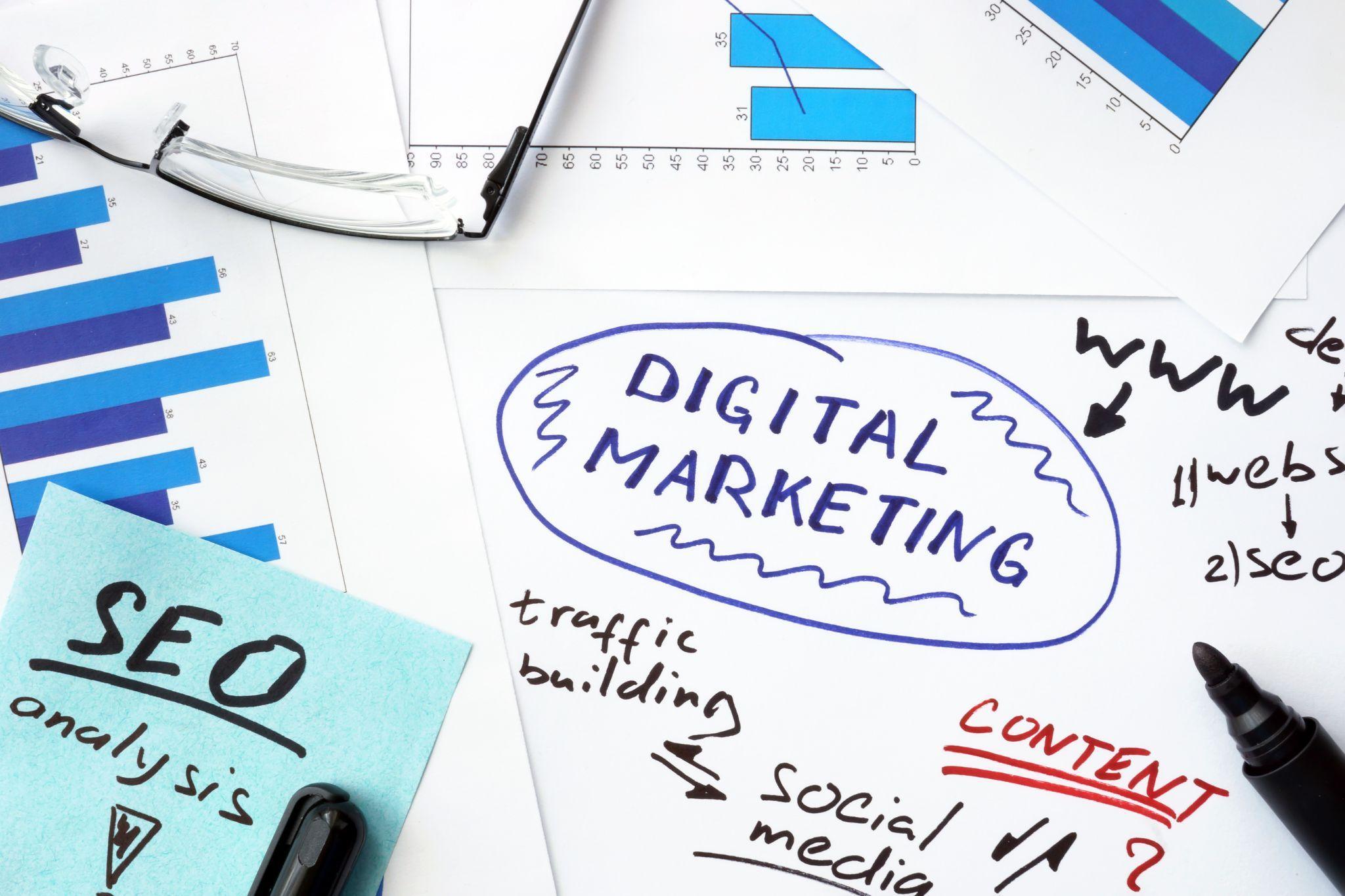
- Insight into Latest Trends: Digital agencies are always up-to-date with the latest trends, technologies, and industry changes, ensuring your marketing strategies remain relevant and effective.
- Project Flexibility: With an agency, you have the flexibility to scale your marketing efforts up or down based on your current needs and business cycle.
- Outside Perspective: An external agency can provide fresh insights and unbiased feedback on your marketing strategies, helping you identify areas for improvement that you might have overlooked.
- Business Recommendations: Drawing on their experience working with different clients and industries, agencies can provide valuable advice and strategies to help your business grow.
- Scalability: As your business grows, a digital agency can seamlessly scale its services to meet your expanding needs.
- Data-Driven Results: Digital agencies use advanced tools and analytics to track your marketing campaigns, providing you with tangible, data-driven results.
By understanding these benefits, you can make a well-informed decision about whether outsourcing your digital marketing to an agency aligns with your business goals.
Selecting the Right Digital Agency for Your Business
To start digital agency for your business is a significant step. A well-chosen partner can unlock potential growth and success, while a mismatch can lead to lost time and resources. Here are some steps to follow when selecting a digital agency for your business:
- Research and Reviews: Begin by researching potential digital agencies. Websites like Clutch.co offer detailed reviews and ratings of various agencies. You can filter your search by factors such as average hourly rate, project size, or location. Pay particular attention to client stories and testimonials that resonate with your business’s needs.
- Review Services: Once you have a shortlist, evaluate each agency’s website, specifically the services they offer. While you may not need every service, it’s beneficial to know they can cater to your current and future needs.

- Portfolio Evaluation: Most agencies showcase their work on their websites. This allows you to see the type of projects they have handled, the challenges they faced, the services they provided, and the results they achieved. These portfolios can provide a glimpse into what working with that agency might look like.
- Discovery Call: Don’t hesitate to reach out directly to the agencies you’re considering. This provides an opportunity to discuss your needs, ask questions, and get a feel for their approach. It also offers a glimpse of what it would be like to work with them.
The best digital agency for your business isn’t necessarily the one with the most awards or the largest client roster. Instead, it’s the one that understands your business, shares your vision, and can deliver strategies that align with your specific objectives and budget.
Decide with your unique needs in mind, and you’re more likely to find a partnership that leads to success.
What Are The Types Of Digital Marketing Agencies?
Choosing the right digital marketing agency can catapult your business to new heights. Uncover the secrets of Full-Service, Single-Channel, and Multi-Channel agencies, and discover how to pick the perfect partner for your unique needs in this comprehensive guide.
Let’s demystify digital marketing together!
Understanding the Different Types of Digital Marketing Agencies
Understanding the different types of digital marketing agencies requires a clear grasp of the services they provide. Although every agency differs slightly, they generally aim to bolster your business’s online presence on various marketing channels.
Services they offer may include content creation, Search Engine Optimization (SEO), social media management, biddable media (like pay-per-click advertising), and email marketing.
However, the extent of these services, the level of specialization, and the approach can vary, making it vital for businesses to assess their specific needs and goals before choosing an agency.
Note that the range of services offered doesn’t just impact the agency’s ability to meet your needs, but also their cost, their workflow, and the required degree of your involvement. So, understanding the offerings of different types of agencies is a crucial first step in finding the right digital marketing agency for your business.
The Full-Service Digital Marketing Agency
A Full-Service Digital Marketing Agency is a comprehensive hub that provides all-inclusive digital marketing solutions. This type of agency usually comprises a wide array of professionals, such as designers, developers, creatives, analysts, and technical experts, all under one roof.
They offer services that span from the creation of a website to the ongoing maintenance of various marketing channels.
Advantages of a Full-Service Digital Marketing Agency:
- One-Stop Solution: One of the primary advantages of such an agency is that all your digital marketing needs are met in one place. Whether you need web design, SEO, content marketing, social media management, or email marketing, a full-service agency can handle it all.
- Smooth Communication and Collaboration: Since everything is under one roof, communication and collaboration are usually easier and more efficient. The entire team can work together and align their efforts, resulting in a more integrated marketing strategy.

However, there are also potential disadvantages:
- Lack of Specialization: While full-service agencies offer a wide range of services, they may not have in-depth expertise in every area. If they are primarily a design agency that also offers digital marketing, the marketing services may not be as strong or effective as those from a dedicated marketing agency.
- Quality Concerns: If the cost of services seems too good to be true, it could mean a compromise in quality. Since full-service agencies handle multiple areas, they may not deliver the same level of quality or detailed attention in every area, which could lead to subpar results in some aspects of your digital marketing.
The Single-Channel Marketing Agency
A Single-Channel Marketing Agency focuses on one specific aspect or channel of digital marketing. This specialization could be in areas like SEO, content creation, social media management, biddable media, or email marketing. As they concentrate on one area, these agencies usually possess a high degree of expertise in their chosen field.
Advantages of a Single-Channel Marketing Agency:
- Specialized Expertise: Single-Channel agencies typically excel in their area of focus, delivering high-quality results because they stick to what they know best.
- Ideal for Smaller Budgets and Specific Projects: If you have a smaller budget or a specific project, a single-channel agency could be a cost-effective choice. They can offer in-depth expertise to boost your visibility in a specific marketing channel.
However, there are also potential disadvantages:
- Limited Scope: As their focus is limited to one channel, a single-channel agency may not fully address the broad and interconnected landscape of digital marketing. It will be up to you to ensure that all other aspects of your digital marketing strategy are covered.
- Potential Communication Issues: If you’re working with multiple single-channel agencies or in-house teams for different elements of your marketing strategy, coordinating everyone could be more challenging, potentially leading to a less integrated approach.
The Multi-Channel Digital Marketing Agency
A Multi-Channel Digital Marketing Agency strategizes and executes campaigns across multiple digital marketing channels. The core of such agencies is a strong strategy that combines specialists from each area. They aim to create visibility across the right channels and integrate them intelligently for a successful online presence.
Advantages of a Multi-Channel Digital Marketing Agency:
- Holistic Approach: Multi-channel agencies understand how various channels can work together to create a cohesive, comprehensive strategy, allowing your business to be at the right place at the right time for your target audience.
- Expertise across Channels: These agencies can devote time, knowledge, and experience to their campaigns without compromising quality, as they usually have specialists for each channel. This strategic, targeted approach can maximize the return on your investment.
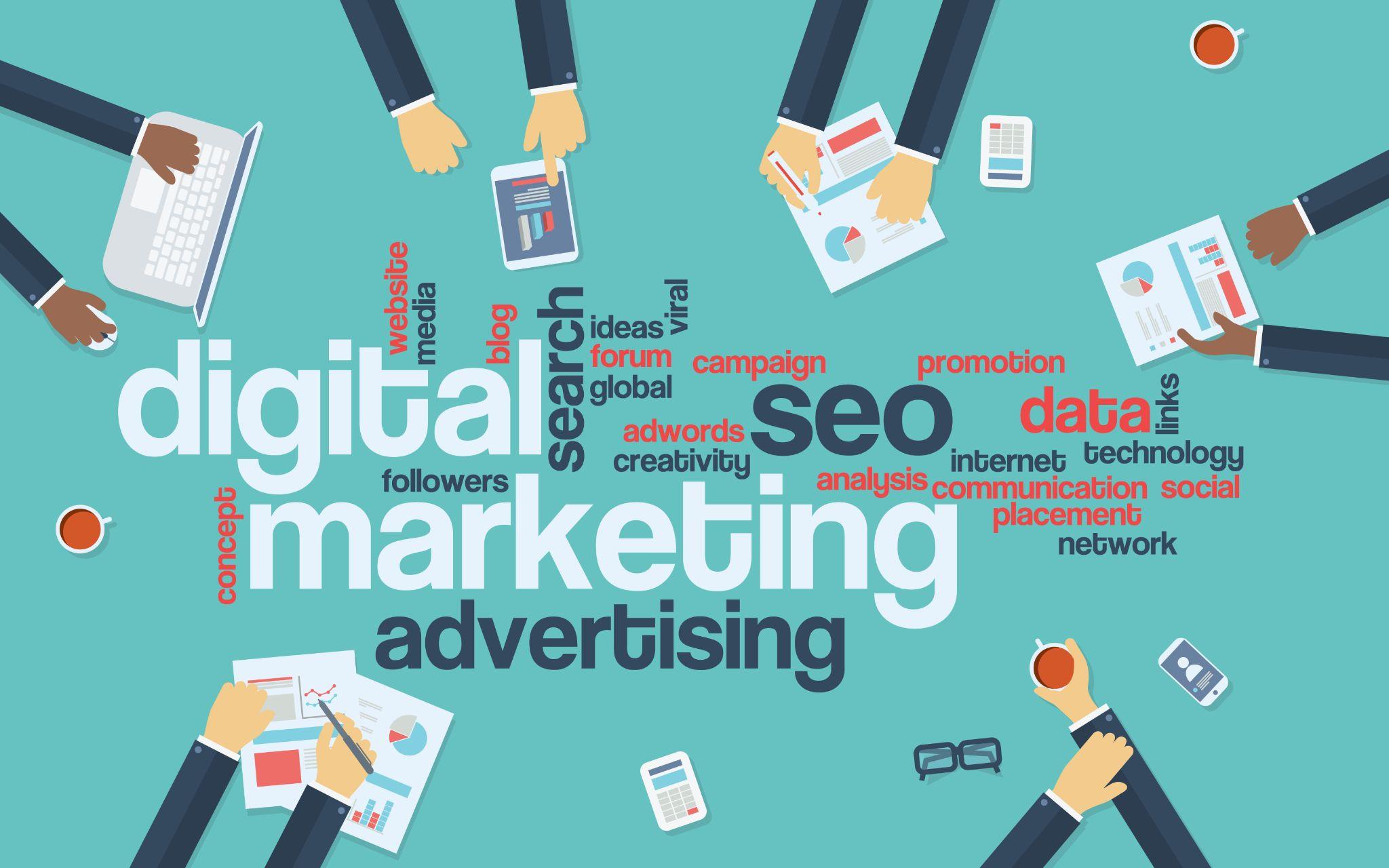
However, potential disadvantages may include:
- Lack of Control: Multi-channel agencies may not be the best fit for businesses that prefer to heavily involve themselves in their digital marketing strategies. These agencies are experts in what they do, and they typically work best when trusted with the strategy and execution.
- Potentially Higher Cost: Due to their comprehensive services, multi-channel agencies may not be suitable for businesses with limited budgets. They generally serve medium to large businesses that aim to be highly visible online.
Are Digital Marketing Agencies Profitable Businesses?
Digital marketing agencies have proven to be profitable ventures, offering growth opportunities and high return on investment (ROI). The digital realm’s ever-evolving nature means these agencies are crucial in assisting businesses to navigate the complexities of digital marketing strategies.
These agencies are particularly invaluable in times of crisis, such as the recent pandemic, where many businesses had to shift their operations online.
A few factors contribute to the profitability of a digital marketing agency:
- Evergreen Industry: The digital marketing industry is continually growing and evolving, making it a sustainable business model. This evergreen nature ensures that there is always a need for these services, keeping demand steady.
- Stable Income: Agencies often work on long-term contracts that generate a steady income, even during recession periods. This aspect provides a level of financial security.
- Valuable Asset: Over time, a well-managed digital marketing agency will accumulate value as a brand and can be sold as an asset if needed.
- Flexibility & Remote Work: The digital nature of this industry allows team members to work virtually from anywhere, providing flexibility and reducing overhead costs.

- Specialization: The ability to select a niche or industry to serve allows you to leverage your expertise and knowledge, which can lead to better results for clients and higher profitability for the agency.
- Job Creation: Digital marketing agencies offer a range of roles and job opportunities, contributing to employment.
- Team Building: You can build a robust team by hiring talented individuals in areas where you may lack strength or interest, thereby fostering a stronger agency overall.
- Healthy Work Culture: By fostering a positive work environment, agencies can retain talent, increase job satisfaction, reduce stress, and drive high performance—all of which contribute to a more profitable business.
The Attraction of a Digital Marketing Agency
The attraction of starting a digital marketing agency primarily lies in the increasing demand for digital marketing services, fueled by the digital transformation businesses have undergone in the last few years. As more companies recognize the value of having a strong online presence, the need for experts who can navigate the complex landscape of digital marketing continues to rise.
Here are some of the key factors that make a digital marketing agency an attractive business proposition:
- Autonomy and Entrepreneurship: Owning a digital marketing agency allows you to be your own boss. You can control your work environment, decide on your clients, choose your working hours, and shape the company culture according to your vision. This sense of autonomy and the thrill of entrepreneurship can be a strong motivating factor.
- High Earning Potential: As the demand for digital marketing services increases, so does the earning potential for those providing these services. With the right strategies and a robust client base, a digital marketing agency can be a very profitable venture.
- Diverse Client Base: The beauty of digital marketing is that it’s needed across industries. Whether it’s a startup, an established corporation, a non-profit organization, or a government agency, they all require a robust digital marketing strategy. This diversity can keep the work interesting and challenging.

- Continuous Learning and Development: The digital marketing landscape is constantly evolving, with new tools, techniques, and trends emerging regularly. Running a digital marketing agency means staying at the forefront of these changes, allowing for continuous learning and professional growth.
- Scalability: A digital marketing agency can start small, even as a one-person operation, and scale over time as you gain more clients and build your reputation. This flexibility and potential for growth are attractive features of starting a digital marketing agency.
- Making a Real Impact: Through a digital marketing agency, you can genuinely help businesses grow and succeed. Whether it’s helping a small business reach new customers or assisting a large corporation in maintaining its market dominance, the work you do can have a significant impact, making the venture personally fulfilling.
While the idea of starting a digital marketing agency can be highly appealing, it’s not without its challenges. Potential business owners should be ready for the commitment, hard work, and risk-taking that come with entrepreneurship.
However, with a passion for marketing, a willingness to learn, and a strong business strategy, running a digital marketing agency can be a rewarding and successful venture.
Evaluating Demand
Evaluating demand for your digital marketing agency entails an in-depth understanding of the market and your potential clients. Start with comprehensive market research to identify gaps in the market, study your competition, and recognize trends in digital marketing.
Engage directly with potential clients using tools like surveys and interviews to ascertain their needs, expectations, and the challenges they face in their current marketing strategies.
A practical approach is to test your services on a small scale or offer free consultations, giving you first-hand insights into the demand for your offerings. Understanding demand will not only help shape your services but also provide a foundation for your agency’s success.
The Essential Skill To Start A Digital Agency
Producing tangible results is a critical skill for a successful digital marketing agency. Clients invest in marketing services with the expectation of seeing a return on their investment, usually in the form of increased brand awareness, lead generation, conversions, or sales.
If you’ve previously worked as a marketer or freelancer, you should have an understanding of how to generate these results. It’s important to showcase your ability to deliver, using previous work, case studies, or testimonials as evidence. In the ever-evolving landscape of digital marketing, staying updated with the latest tools and techniques is essential to ensure you continue to provide effective strategies that deliver results.
Additionally, leveraging data analytics tools like Semrush can help track performance and illustrate your effectiveness to clients. If you can prove your capacity to produce results, your agency will stand out among competitors.
Building a Team
Building a team is an integral part of transitioning from a solo freelancer to running a digital marketing agency. As your client base grows, you’ll need additional manpower to handle the increased workload and to offer a broader range of services.
It involves more than just hiring individuals with the right skills; you need to consider how these individuals will work together to fulfill your agency’s mission. Effective team-building requires you to navigate legal aspects, recruitment processes, and training programs.

It also demands leadership and management skills, as maintaining a motivated, harmonious, and productive team is crucial. Beyond technical skills, look for team members who share your vision and commitment to delivering high-quality results to clients.
It’s important to remember that as an agency owner, you’ll spend less time on marketing and more on managing different business aspects, including your team.
The Long-Term Commitment
Starting a digital marketing agency is a long-term commitment that involves more than just the initial setup. As a business owner, you shoulder the responsibility for the success of your agency and the livelihood of your employees. This commitment means navigating daily pressures, addressing challenges head-on, and continuously striving for growth even in the face of adversity.
Challenges may include slow initial client acquisition, loss of clients, or investments that don’t yield expected returns. The journey won’t always be smooth and will demand your presence and problem-solving skills even on tough days.
It’s crucial to maintain a passion for marketing and the industries you serve, as this passion will fuel your drive to overcome obstacles and build a successful agency. In essence, running a business requires resilience, perseverance, and a commitment to delivering value to clients regardless of the hurdles you encounter.
Vision and Goals
Having a clear vision and defined goals is critical when starting a digital marketing agency. Your vision is a long-term view of what you want your agency to be, while your goals are specific milestones that will help you get there.
Your vision could encompass aspects like the kinds of clients you want to serve, the culture you wish to foster, and the impact you aim to have on your clients’ success. Meanwhile, your goals should be SMART – Specific, Measurable, Achievable, Relevant, and Time-bound. They might include targets for client acquisition, revenue, team growth, or service expansion.
Having a clear vision and goals not only gives you direction but also helps motivate your team, attract the right clients, and measure your progress. It’s essential to remember that starting a digital marketing agency without a vision or goals is like embarking on a journey without a map or destination.
Developing The Necessary Skills
For all the budding Gen Z digital marketers envisioning themselves as the next Neil Patel, the journey to success in this field requires far more than creativity and intelligence. It takes genuine hands-on experience, a broad range of skills, and the ability to navigate the nuances of account management and client relationships.
Work environments are multi-layered ecosystems filled with both explicit and implicit expectations, complex communication dynamics, and intricate politics. Every facet of an organization – its structure, culture, product, and leadership – shapes your daily tasks and the trajectory of your career.
Understanding these dynamics is pivotal in molding you into a well-rounded professional, especially since many of your potential clients might operate within similar environments.
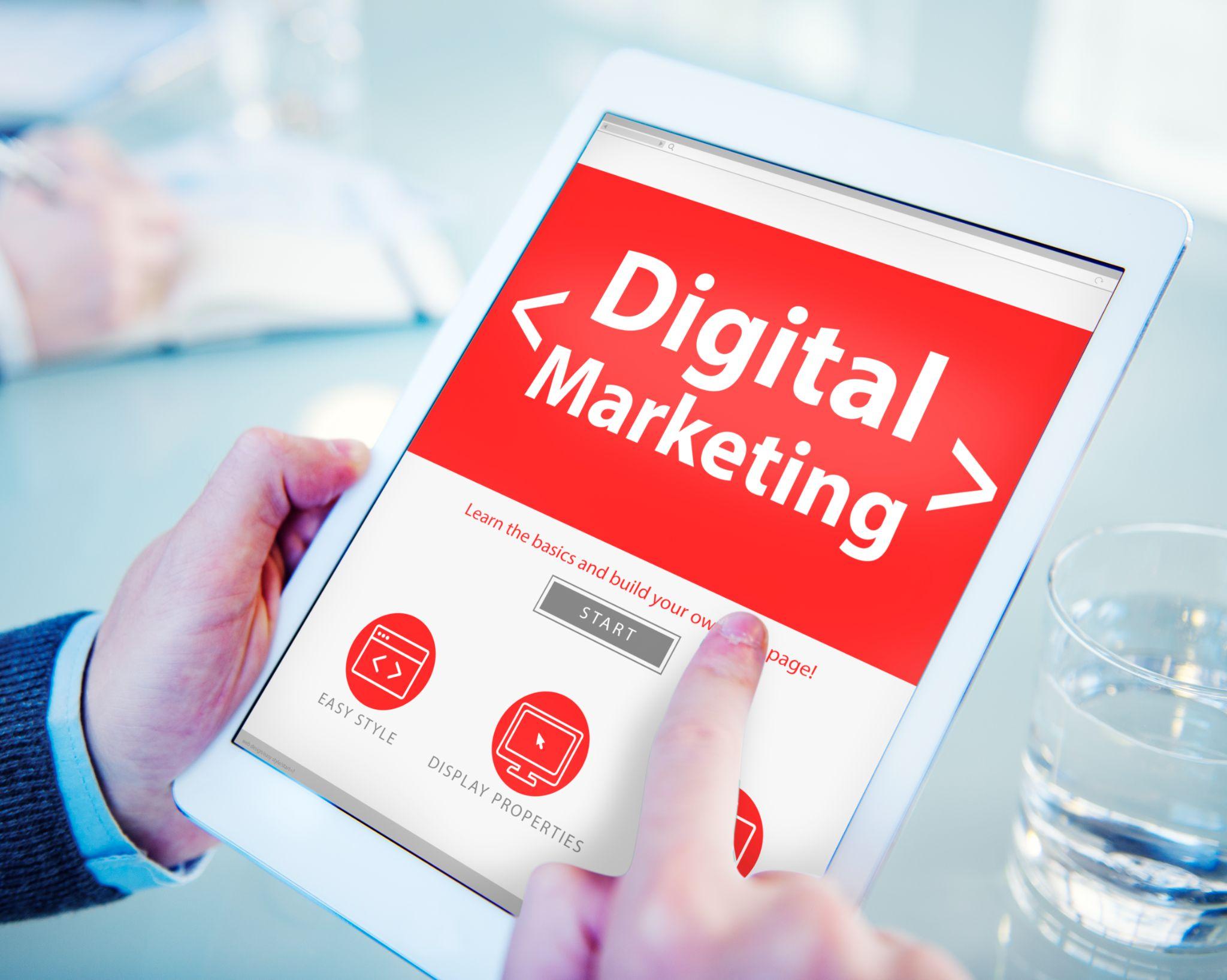
It’s advisable to start your career either managing clients for larger agencies or as part of a dedicated marketing team. This will give you exposure to multiple aspects of digital marketing and the opportunity to hone your skills.
Those outside the marketing ecosystem might underestimate the breadth and depth of work that goes into digital marketing. Beyond the obvious pressure to deliver results, marketers must navigate complex systems and, in smaller teams, develop a wide range of skills to execute even basic campaigns.
This includes building landing pages, designing ads, formulating effective messaging and positioning, mastering tools like Marketo, HubSpot, and Salesforce, implementing tracking correctly, and even dealing with failed promotions after investing significant time and effort.
Consider A Contractor Path As A Stepping Stone To Becoming A Founder
Before transitioning to entrepreneurship full-time, working as a contractor provides a unique opportunity to gradually immerse oneself in the world of business ownership, all while minimizing risk. This is beneficial for a multitude of reasons.
Moreover, side projects conducted while maintaining a stable job allows one to taste the entrepreneurial life without having to give up the financial stability and benefits of full-time employment.
Through such engagements, one gets accustomed to the crucial aspects of running a business, from invoicing and tax obligations to time management. It can mean giving up leisure activities for work, but the trade-off might just be worth it.
In this capacity, you can build your entrepreneurial muscles by managing clients on the side. It provides valuable hands-on experience in developing contracts, preparing proposals, signing documents, and familiarizing oneself with NDAs.

Working as a contractor also opens doors to building invaluable relationships. By leveraging mutual connections, former colleagues, or through active networking, it’s possible to secure side projects that serve as a launchpad to test the waters.
A crucial yet often overlooked aspect of this preliminary stage is the opportunity to hone negotiation skills, particularly when it comes to valuing your services. Every entrepreneur must learn how to quantify the worth of their time and expertise and communicate this effectively to clients. This skill is not only pivotal in the early days but also invaluable as your business grows.
It’s about paving the pathway to your agency, reducing uncertainties, and ensuring you are equipped to face the challenges that come with being a founder.
The Digital Agency Business Model
Now we know how to manoevour pur ways safely into digital agencies, let’s move on to the business models now. Navigating the complex world of business pricing can be daunting, especially for digital agencies. One key question often surfaces:
How do these agencies make money?
Now, we dissect the most common pricing models employed by digital agencies – retainer, hourly, commission/performance-based, and flat fee/fixed fee – and explore their respective merits and challenges.
The Retainer Pricing Model
Retainers play a significant role in revenue planning for digital agencies. The retainer pricing model implies a client pays an upfront fee to secure an agency’s services over a certain period.
These contracts may span months or even years, providing a steady, predictable income stream. This allows agencies to more accurately forecast their revenues, plan their expenses, and make strategic business decisions.
Revenue planning with retainers is advantageous as it eases cash flow management. It gives an agency the financial security and freedom to allocate resources efficiently, plan for non-billable hours, and make necessary investments.
The Power of Predictability: How Retainers Add Stability
Predictability in business, especially in terms of revenue, is a crucial aspect of long-term stability. Retainers provide just that for digital agencies. This model ensures a regular inflow of funds, providing a layer of financial security that’s not always common in project-based work.
Predictable revenue helps agencies manage their cash flow effectively, facilitating smoother operations. Furthermore, it allows for more informed strategic decisions, such as hiring new staff or investing in new resources or technologies.
Notably, with the added financial predictability, agencies can focus on delivering higher-quality services. With less concern over where the next payment is coming from, the agency can divert more resources to improving its services, ultimately benefiting the client and fostering a healthier, longer-term client-agency relationship.
The Hourly Pricing Model
The hourly pricing model is another common method used by digital agencies, which revolves around charging clients for every hour spent on a specific project. The rate per hour is usually predetermined, based on various factors such as the complexity of the task, the skill level required, and market standards.
This model’s simplicity makes it easy to understand for both agencies and clients.
To implement this model, an agency needs to decide the hourly rate for each service it provides. This rate needs to be high enough to cover operational costs and generate a profit, but also competitive enough to attract and retain clients.
Managing Scope Creep and Profitability Through Hourly Charges
Hourly pricing can also be a useful tool for managing ‘scope creep’ – when a project expands beyond its initially agreed boundaries. By charging on an hourly basis, agencies can ensure that they are adequately compensated for all the work they do, including any extra tasks or additional time required that wasn’t anticipated at the project’s outset.

This model also allows for better tracking of profitability. By understanding how many hours go into each task, an agency can more accurately measure its operational efficiency and ensure that it’s charging enough to cover costs and generate a profit. This transparency helps in team-hour management and setting realistic project schedules.
However, it’s crucial for agencies to avoid the common pitfall of undercharging, failing to account for non-billable hours, like administrative tasks, team meetings, and professional development, which are part of running a successful agency.
The Commission/Performance-Based Pricing Model
The commission or performance-based pricing model is a dynamic and potentially lucrative approach used by some digital agencies. This model ties the agency’s payment to the measurable outcomes it achieves for the client. For example, an agency may get paid based on the number of leads it generates that convert into customers.
This model is particularly attractive for seasoned agencies that are confident in their ability to deliver strong results. It can create a strong alignment of interests between the agency and the client, as the agency is directly incentivized to succeed. It can also be extremely rewarding financially if the agency consistently performs well.
Managing Volatility and Risk in a Performance-Based Model
While the performance-based pricing model can be highly rewarding, it also comes with its own set of challenges and risks. One of the most significant risks is the volatility of income. Since the agency’s revenue is tied directly to performance, it can fluctuate widely based on the results delivered in a particular period.
In addition, there is a risk that clients might choose to end the contract or be reluctant to pay if the outcomes aren’t as expected. This unpredictability can pose a challenge for agencies in managing their cash flow and planning their expenses.
To mitigate these risks, agencies using a performance-based model often establish key metrics or conversion values to align expectations with clients.
In some cases, they may also choose to charge a flat fee upfront to provide a base level of income stability. This way, they can still enjoy the potential upside of high performance while managing the downside risks.
The Flat Fee/Fixed Fee Pricing Model
The flat fee or fixed fee pricing model entails charging a single, pre-determined fee for a particular service or project. This pricing structure is especially useful for agencies offering one-off services such as website development, SEO audits, or marketing campaign setups.
The simplicity and transparency of the flat fee model can be attractive to clients, as they know upfront exactly how much a service will cost, allowing them to budget accordingly. For agencies, this model offers a clear revenue stream from well-defined tasks or projects, minimizing debates about costs or overruns.
Project Cost Estimation for Fixed-Fee Pricing
However, to make a fixed-fee pricing model work effectively, accurate cost estimation is crucial. Agencies must calculate the total number of hours they expect a project to take and multiply that by their desired hourly rate. This becomes the fixed price for the project.
Effective cost estimation involves understanding the scope of the project, the resources required, and the potential challenges that might arise. Underestimating the time and resources needed can lead to lower profitability or even losses.

Agencies also need to account for any potential for scope creep, where the client might request additional work or changes that weren’t included in the initial agreement. To address this, agencies often specify the project’s scope and deliverables carefully and clearly, outlining what changes or additions would incur additional charges.
This pricing model can be a good option for agencies starting out or those that struggle to secure retainer-based clients, as it can offer a clear, straightforward pricing structure that both parties can easily understand and agree upon.
Steps To Start A Digital Marketing Agency
We’ve got everything in place, now let’s move on to the next step. From deciding the services you’ll offer, selecting a niche, marketing yourself, and ensuring service delivery, to leveraging the right tools – here’s all you need to kickstart a successful digital marketing agency.
Service/s to Offer
Choosing the right services to offer is your first step in setting up a digital marketing agency. Think of it as picking the tools you’ll use to solve your clients’ problems.
You have an array of exciting options to choose from. Your agency could offer everything under the digital marketing sun, or focus on one or a few complementary services. Some of the hot picks include SEO, social media, pay-per-click ads, email marketing, video marketing, influencer marketing, content marketing, and website design.
For instance, a website design company might also offer SEO services to the clients they build websites for. Offering complementary services creates a cohesive, efficient solution for your clients. Remember, each service you add should amplify your agency’s value and drive results for your clients.
Next, let’s dive into how to choose the right niche for your agency!
Choose a Niche/s
Choosing a niche is a critical step in the process of starting a digital marketing agency. It helps you stand out in the crowd and enables you to hone your expertise in a specific industry or market.
The digital marketing world is vast and quite competitive. There’s a plethora of agencies offering similar services. To dodge the “generic” tag, you need to choose a niche or a particular sector you want to serve. This could be anything from tech startups to local restaurants, from e-commerce to non-profit organizations.

Choosing a niche allows you to focus on a smaller, specific target audience, enabling you to speak their language and meet their needs more effectively. As you get to understand your niche better, you can create processes built around the repetitive work you do, becoming more efficient and increasingly specialized.
But remember, this advice might not suit everyone. If you love variety and wish to explore various projects, being a generalist might be the way for you.
After you have identified your niche, the next step is to find your clients and market your agency. Let’s jump into that next.
Find Clients/Market Yourself
Marketing yourself and finding clients is the key to starting a successful digital marketing agency. The process can be challenging, considering the intense competition, but as a marketer, you must know how to stand out and present your business effectively. Here’s how you can do it:
- Create a Website: A website acts as your digital storefront. It’s a place where potential clients can learn about your services, see your portfolio, and connect with you. It helps build credibility and trust. Remember, while a website is crucial, don’t spend too much time on it at the beginning. The focus should be on speed and getting your message out there.
- Cold Call/Cold Email: Despite the criticism these methods receive, cold emailing and cold calling can be very effective if done right. They can help you reach potential clients quickly. Customize your approach, research about the company, and the individual before reaching out. This can grab attention and demonstrates that you’re willing to put in extra effort.
- Create a Portfolio: A portfolio is a powerful tool to showcase your capabilities. It’s a visual testament of your previous works and results, helping build trust and persuade potential clients. Make sure to include timelines, important metrics, and a brief on why the results were successful.
- Content Marketing: This is a long-term strategy involving the creation of relevant content such as articles, videos, and other media to attract and engage your audience. Consistent, high-quality content can establish you as an authority in your niche and generate significant inbound leads.
- Build Social Media Accounts: Social media is a great platform to engage with your audience, provide updates about your agency, and showcase your expertise. Focus on platforms where your target market spends most of its time.
Marketing your digital agency is a full-time job. The idea is to ensure that potential clients understand what you do and feel comfortable choosing you over the competition. After you’ve found your clients, the next step is to nail down service delivery.
Nail Down Service Delivery
“Nail Down Service Delivery” is all about ensuring you have a system in place to consistently deliver high-quality services to your clients. It’s the second half of running a successful digital marketing agency, and it’s just as crucial as finding clients.
The key thing to remember here is that running an agency is different from being a freelancer. As a freelancer, you might be doing all the client work yourself. But as an agency owner, your focus should be on building systems, training your team, and finding new clients. You should spend your time strategizing, not just executing.

Think about the tasks that you repeat often – can you automate them or delegate them to someone else? Remember, the goal is to deliver quality results consistently, without it eating up all your time. This is the only way you’ll be able to continue growing your client base while also ensuring your existing clients are happy.
So, get comfortable with the idea of not doing all the client work yourself. Start focusing on building systems and processes that can handle service delivery, so you can focus on what you do best – growing your agency.
Is It Possible to Start a Digital Marketing Agency Without Any Experience?
So, you might be wondering, “Can I start a digital marketing agency if I don’t have any prior experience?” The short answer is, yes, you can!
It’s entirely possible to start a digital marketing agency with no prior experience. Your first step, however, should be to get educated. The good news is that the digital marketing world is abundant with learning opportunities. All you need is a strong willingness to absorb new information.
Digital marketing has many aspects such as SEO, PPC, social media, content marketing, and more. You can start by learning about these topics online or through courses. The aim is to understand the dynamics of the industry and build a solid foundation of digital marketing knowledge.
But remember, just because you can start an agency with no experience doesn’t mean it’ll be easy. You’ll need to work hard, learn fast, and be ready to adapt to the ever-changing digital landscape. But with dedication, curiosity, and a strong drive to learn, you can definitely make your mark in the digital marketing world.
Tools You Need to Run a Digital Marketing Agency
Setting up a digital marketing agency requires several key tools to help you manage your business, track growth, coordinate with team members, and deliver quality service to your clients. Let’s discuss the top five tools that can give you a significant advantage.
Semrush
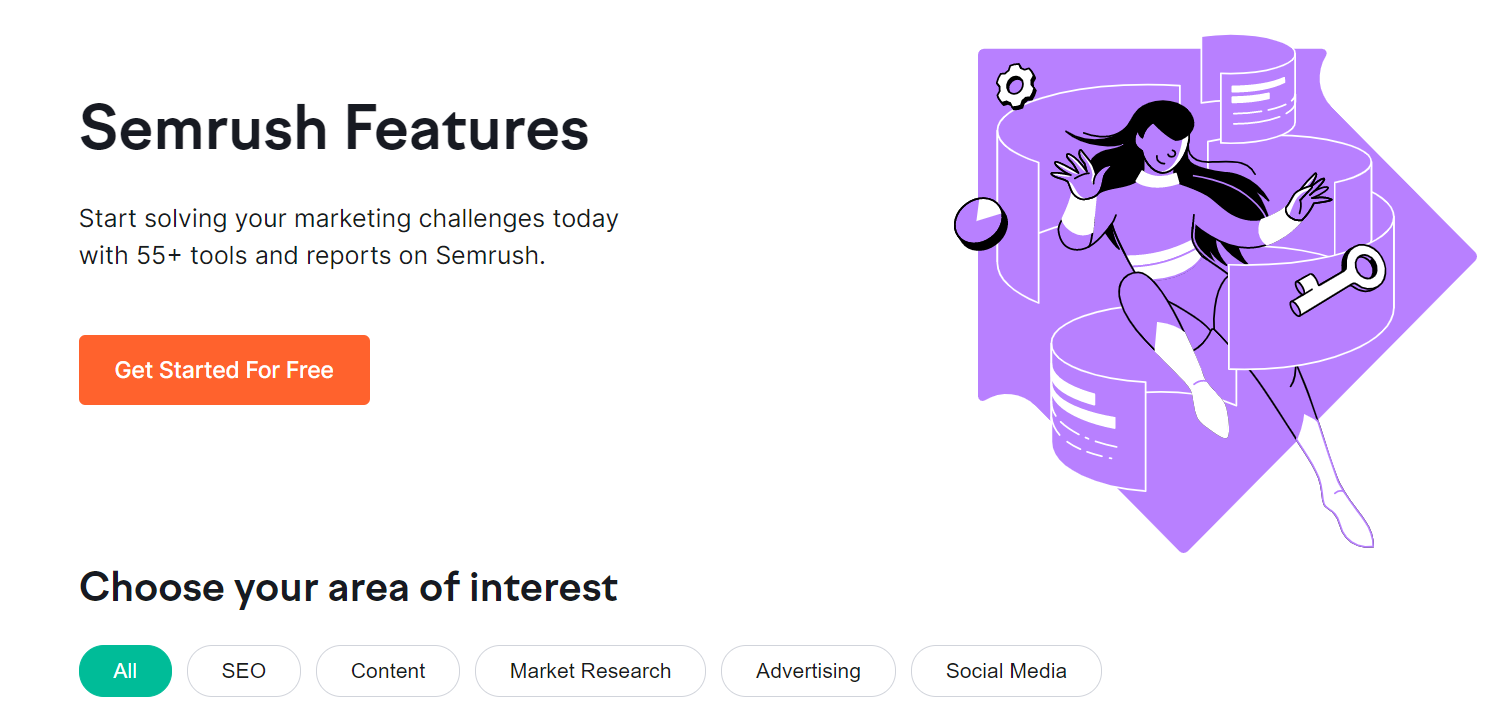
Semrush is a comprehensive digital marketing toolset that’s pivotal to the success of your digital marketing agency. Here’s what you need to know:
- All-in-one Tool Suite: Semrush provides over 50 different digital marketing tools. These tools cover a wide range of services, including SEO, PPC, Social Media Marketing, Keyword Research, Competitive Research, PR, Content Marketing, Marketing Insights, and Campaign Management.
- Agency Growth Kit: Beyond its core functionalities, Semrush offers the Agency Growth Kit. This kit is designed to help digital marketing agencies flourish. It includes features like Agency Partners, which is a directory where potential leads can find and contact your agency.
- Bid Finder and CRM: The Bid Finder feature provides access to a database of high-value marketing contract bids. The CRM tool helps manage your agency’s relationships with clients and potential leads.
- White-label Solutions: Semrush also offers white-label solutions. These include a client portal and automated PDF reports with custom messages, both of which you can brand as your own.
With Semrush, you have an all-encompassing suite of tools and resources to help your agency gain visibility, discover marketing insights, and manage client relationships effectively.
Google Apps
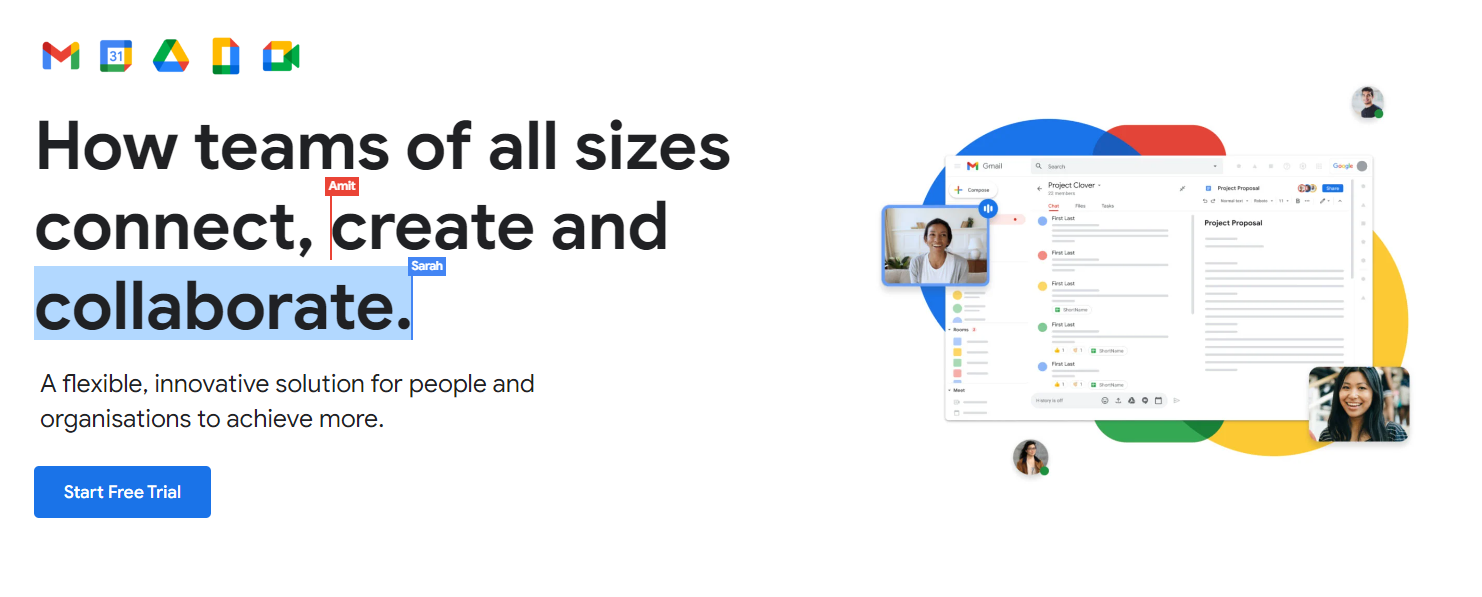
Google Apps, now known as Google Workspace, is an integral set of tools for running your digital marketing agency. Here’s how they support your operations:
- Google Docs: This is a collaborative word-processing tool. You can create, edit, and share documents with your team in real time.
- Google Suite: This is the overarching suite of productivity tools including Google Docs, Sheets, Slides, and Drive, among others. They provide a platform for collaborative work within your agency.
- Google Adwords: Now known as Google Ads, this is a tool for creating and managing pay-per-click advertising campaigns.
- Google Business: Also known as Google My Business, this is a tool for managing your agency’s online presence across Google, including Search and Maps.
- Google Sheets: This is a spreadsheet tool similar to Microsoft Excel but with real-time collaboration and cloud-based access.
- Google Analytics: This tool helps you track and report website traffic, providing invaluable insights for your agency and your clients.
These Google Apps form a significant part of your agency’s digital infrastructure, aiding in everything from team collaboration to data analysis and campaign management.
Zapier

Zapier is a robust tool that plays a vital role in streamlining your digital marketing agency’s operations. It’s an online automation application that connects various software you use daily, making your processes more efficient. Think of it as a digital bridge that links your apps and automates repetitive tasks.
Here’s what makes Zapier indispensable:
- Automation: Zapier allows you to automate tasks between different online apps. For example, you can create a “zap” (automated workflow) that saves email attachments from Gmail directly to Dropbox.
- Integrations: Zapier boasts integrations with thousands of apps. Whether it’s your email, project management tool, CRM, or even social media platforms, Zapier can link them all.
- Time-saving: By automating repetitive tasks, Zapier frees up valuable time. This lets you and your team focus on strategic, high-level work.
The power of Zapier lies in its flexibility and customization. It can become an essential cog in your agency machine, keeping things running smoothly behind the scenes.
Hunter.io
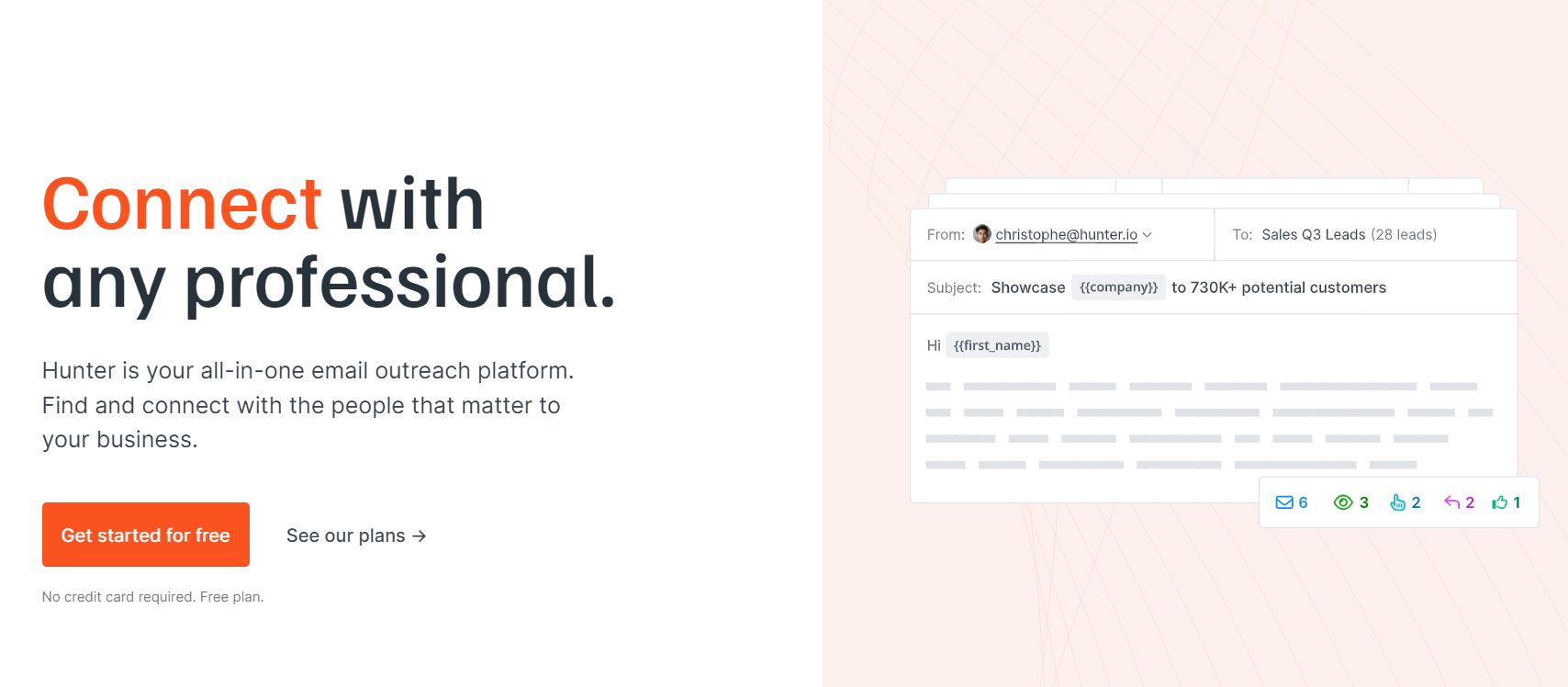
Hunter.io is a powerful online tool designed to ease the process of finding and verifying professional email addresses, which is particularly useful for marketing and sales outreach. In the early stages of running a digital marketing agency, cold emailing can be a great way to quickly reach potential clients, and Hunter.io facilitates this process.
Here’s how Hunter.io can boost your agency’s operations:
- Email Finder: Hunter.io scours the web to find the email addresses associated with any company. This makes it much easier to reach out to potential clients or collaborators.
- Email Verifier: The tool also verifies the deliverability of email addresses, reducing the chance of your emails bouncing back or landing in the spam folder.
- Chrome Extension: Hunter.io offers a free Chrome extension. This means you can use its services directly from your web browser without needing to switch applications.
- Email Outreach: Hunter.io can help manage your email outreach, streamlining the process of connecting with potential clients.
So, we can say that Hunter.io can expedite your agency’s growth by speeding up the client acquisition process, saving time and increasing your outreach efficiency.
Loom
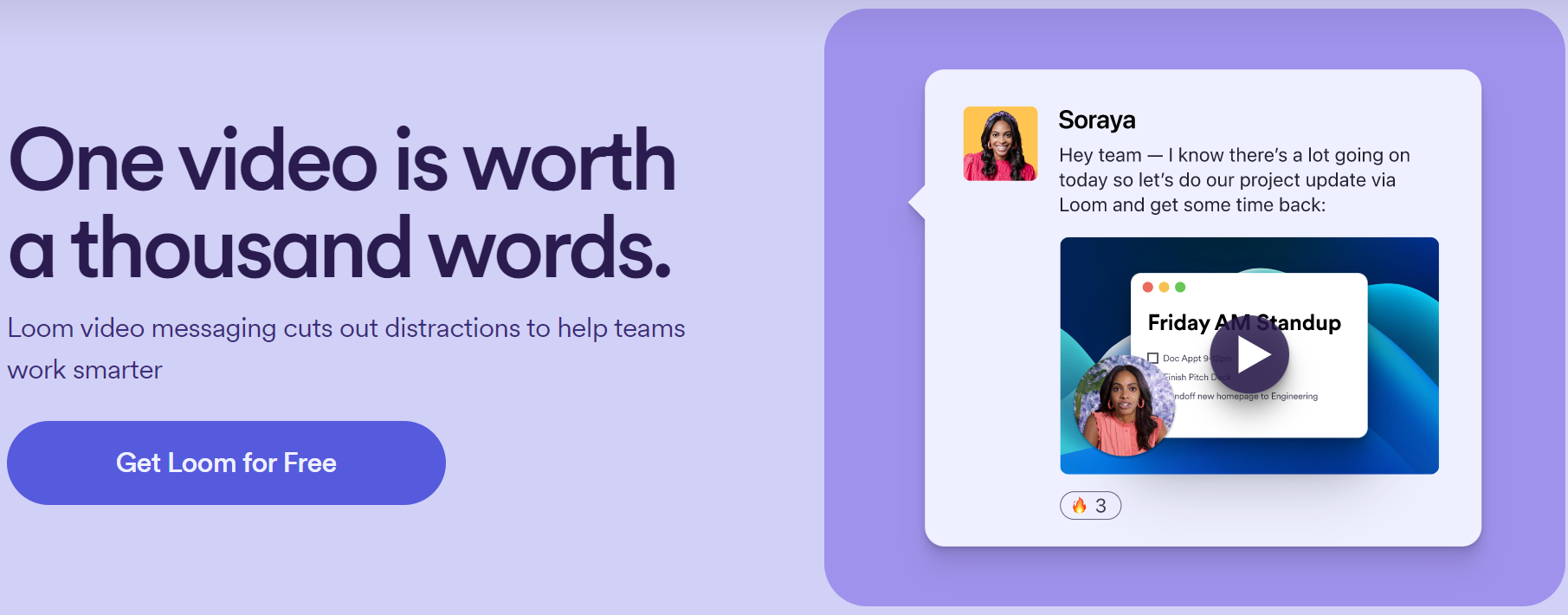
Loom is a fantastic tool that takes communication to a whole new level. It’s an easy-to-use, intuitive platform that allows you to record your screen and audio with just a click, making it simple to share information with clients or team members. Here are a few things you can do with Loom:
- Screen and Voice Recording: Need to explain a complex process or present a digital report? With Loom, you can record your screen and your voice simultaneously, creating a personalized video guide that’s easy for recipients to follow.
- Efficiency: Loom helps replace lengthy emails and unnecessary calls. Instead of writing a long email or setting up a meeting, you can simply record a quick video explaining your thoughts or instructions.
- Easy to Use: Loom is a Chrome extension, meaning it integrates seamlessly with your browser. You can start a recording without leaving your current tab or opening a new application.
- Saves Time: No need to schedule and coordinate meeting times. Loom videos can be viewed whenever it’s convenient for the recipient, and they can even be rewatched for clarity.
Loom is like having your own mini production studio at your fingertips, simplifying communication within your agency and making you seem like a digital marketing demigod to your clients.
Is a Digital Agency Profitable? And Which Business Model Is Best?
So you might be wondering, can a digital marketing agency really rake in profits? The answer is a resounding “Yes!” In fact, digital marketing agencies are often more profitable than many other types of businesses.
According to a database from NYU Stern, which includes over 7,000 companies, the average profit margin is around 7.9%. In contrast, some digital agencies have been known to achieve profit margins of up to an impressive 40%.
This profitability is often due to the ability to operate fully remotely, cutting down on costs like rent, utilities, and commuting. Plus, the demand for digital marketing services is skyrocketing, making the business model highly sustainable.
As for the best business model, it largely depends on your unique agency setup. However, a profitable approach is often to offer a mix of services, ensuring multiple revenue streams. For example, you might provide SEO, content marketing, and social media management, and bundle these into packages for clients.
This diversified approach can help maintain a steady income, even if one area experiences a temporary downturn. Ultimately, the best business model is the one that maximizes your agency’s strengths and caters to the specific needs of your chosen niche.
Is Starting a Digital Marketing Agency Worth It?
The burning question remains, is launching a digital marketing agency really worth it? Without a doubt, the answer is an enthusiastic “Yes!” Here’s why:
Digital marketing agencies are not only potentially profitable, as we’ve discussed, but they also present an opportunity to flex your creativity, problem-solving skills, and business acumen. The world of digital marketing is dynamic and ever-evolving, providing an exciting challenge for those who love to stay on the cutting edge.

Additionally, if you are committed to delivering results for your clients, managing a team of professionals, and marketing your own agency, then you can certainly build a successful and profitable business. It might seem intimidating, but remember, there are countless resources and tools, like Semrush, available to assist you on this journey.
Starting a digital marketing agency can be more than just a worthwhile venture; it can be a rewarding career path that allows you to make a meaningful impact in the business world. You will not only help other businesses thrive but also create a thriving business of your own.
Final Thoughts
And there you have it, the ins and outs of setting up your own digital marketing agency. Remember, it all starts with choosing the right services to offer and identifying a niche that allows you to shine.
Securing clients might seem like a daunting task, but with a great website, cold outreach, a stunning portfolio, engaging content, and an active social media presence, you’ll be on your way to success.
Delivering top-notch service efficiently is crucial, and luckily, you have tools like Semrush, Google Apps, Zapier, Hunter.io, and Loom to help streamline operations. And don’t fret if you’re starting with zero experience.
If you’re eager to learn, you can make it happen. So, is it worth it? Absolutely. There’s nothing quite like turning your passion into a profitable venture. Now, get out there and start making your digital marketing agency dream a reality!
You can Also Read: How To Start A Blog in 2023 || 25K Words Guide
